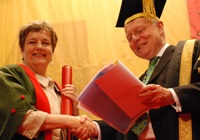Ms Rachel Lomax

Ms Rachel Lomax receives the Honorary Fellowship from Sir Emyr Jones Parry.
15 July 2010
The presentation of Ms Rachel Lomax as Honorary Fellow of the University by Mr Winston Roddick on Thursday 15 July 2010.
Mr Llywydd, mae’n fraint o’r mwyaf y prynhawn hwn i gael cyflwyno i chwi Rachel Lomax i’w anrhydeddu fel Cymrawd y Brifysgol.
President, I have the pleasure this afternoon of presenting to you for an Honorary Fellowship of this University Rachel Lomax whose roots are deep into Welsh soil. Her family hails from Ystalafera, which is at the top of the Swansea valley. Her mother’s side of the family spoke Welsh. Rachel Lomax herself was born in Mumbles, on the Gower Peninsula. Most of you will know that Mumbles has a lifeboat which is often launched into a tempestuous sea. Rachel’s career was not launched into a tempestuous sea but it did take her to the higher stratosphere, the higher stratosphere of the world of finance and Public Administration. She is the mother of two children and, as I will demonstrate in a moment, she is one of the few women to have risen to the top in the male-dominated world of the mandarinate.
She has spent most of her career at the heart of the British economy. She had 26 years at the Treasury before becoming a vice-president of the World Bank in 1995/96. At the Treasury, she was private secretary to Nigel Lawson when he was Chancellor of the Exchequer in the mid 1980s and she became deputy chief economic adviser in the early 1990s. She was head of the Economic and Domestic Secretariat at the Cabinet Office in 1994. In 2003, she became the first woman deputy governor of the Bank of England where, as a member of the bank’s Monetary Policy Committee, she had responsibility for monetary stability and held that position until 2008 when she became only the third woman to be a member of the board at HSBC, Europe’s largest bank.
Mr. President, it is good to be able to say nice things about bankers and so it gives me pleasure to point out that during her five years on the Bank of England’s Monetary Policy Committee she rarely voted to raise interest rates, establishing her reputation as a dove and one of the MPC’s more moderate, centrist figures. On the rare occasions she did back a rate rise, people sat up and listened. And it is my personal experience of her that people do listen when Rachel Lomax speaks. She has a reputation for taking decisions coolly and getting them right – just the sort of adviser to have on hand in a global economic crisis.
Whilst most of her life has been in the world of finance, she spent a substantial period before her time with the Bank of England as a top civil servant. Between 1996 and 2002 she was Permanent Secretary successively at no less than three government departments, including the Dept. for Transport, the Welsh Office, where she oversaw the setting up of the National Assembly for Wales and to which I shall return in a moment, and, before leaving Whitehall for the Bank of England, the Department for Work and Pensions,
Her interests range wider than the Civil Service and the world of banking. She continues to contribute to public life in other ways. As an example of these wider interests I can cite the fact that she is on the board of the Royal National Theatre.
I should like to conclude Mr. President, with some personal reflections. They probably explain why the University invited me to make this presentation today. I said earlier that I would return to Rachel Lomax’s period as the Permanent Secretary at the Welsh Office. In 1998, the Government introduced fundamental changes to the British constitution. These included the setting up of the National Assembly for Wales and the devolution of legislative and other responsibilities away from Westminster. That process of change required skilled handling for it was without precedent in our constitutional history. Rachel Lomax, as the Permanent Secretary at the Welsh Office, was the right person at the right place at the right time to handle that process of change and it was a marked success, without doubt. It became a period of change for me as well, for it was at this time that I was appointed to be the first Counsel General to the National Assembly for Wales and as such I was responsible to Rachel Lomax. It was an unusual experience for a barrister to move at a stroke to the higher reaches of the civil service but through working with Rachel Lomax and other senior civil servants I learnt much about government and about our Civil Service. In particular, I learnt that what Professor Holland of University College London said in a lecture to his constitutional law students that we are governed not by Government but by the Civil Service is very true. We have an excellent Civil Service and impressive Civil Servants of which Rachel Lomax is the finest example. She is very experienced, highly persuasive, charming - and formidable in the offensive, and, dare I say, she has excellent judgement when it comes to choosing persons for the job.
Mae yn bleser o’r mwyaf felly Llywydd i gyflwyno Rachel Lomax i chwi i’w anrhydeddu yn Gymfrawd ein Prifysgol.
Diolch yn fawr.
Winston Roddick CB QC 15th July 2010



